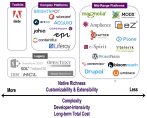The Omniture Drag - and your quest for aligning web content and analytics
In recent months I've encountered several customers of web analytics mega-vendor Omniture who had a very specific gripe about the platform: it was too hard to integrate Omniture reports and analytics into other applications, specifically their Web CMS dashboards. (Note: I'm not talking here about integrating vendor's JavaScript tracking code into your CMS -- that's usually trivial -- but rather, exposing reports in a CMS dashboard.)
At least three Web CMS vendors have also privately complained to us about Omniture in this regard. I think it's revealing that CMS vendors announce plans to implement Omniture reports in-line, but they never seem to come off.
To be fair, report integration can get difficult other analytics vendor offerings as well. My colleague Phil Kemelor points out that WebTrends and other commercial web analytics vendors can also be rigid in this regard. He's right, although I've seen WebTrends report or data integrations across various CMS packages, but have never seen anything similar with Omniture reports.
As our Web Analytics research subscribers know, Omniture has a reputation for being particularly closed when it comes to exporting data or reports. It wants to become your web data warehouse and central analytics hub. Case in point: you have to go to great lengths even to remove Omniture's logo from their reports when e-mailing them around internally.
I believe this mountain-comes-to-mohammed approach represents a hidden drag on Omniture licensees.
Why does this matter? I think content managers want to access analytics in a place where they can take action. Omniture would have you log into their dashboard, but many casual web managers find that too complicated, too remote, and not actionable. Web managers then tend to turn to (the probably over-worked) in-house Omniture guru. That seems wasteful. In these economic times, analytics are too important to be left only to analysts.
(One increasingly evident alternative -- resorting to the lightweight traffic metrics possibly built into your CMS -- doesn't solve the problem either. These CMS-driven systems typically deliver sub-standard metrics that even their vendors won't fully stand behind.)
Integration aside, the larger point is that web managers need to get savvier about analytics, rather than depending on others. Questions abound. What are the key technical issues? What data can you trust more than others? How do you effectively measure campaigns? And so on. (Disclosure: we answer many of these questions in our Web Analytics Fundamentals certificate course.) However you get there, if you're a web manager or web content specialist, learn more about analytics. Then push your vendor to deliver the right reports to the publishing tools you already use every day -- so you can act on them.
What do you think?








